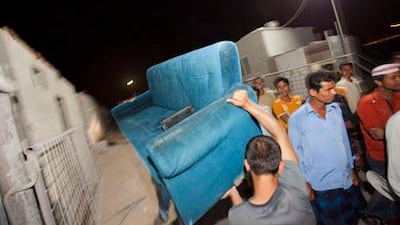AJMAN // On Sunday the worn red love-seat stood unwanted in a home in Dubai, waiting to be thrown out.
Two days later it was set down in a dusty, concrete, fluorescent-lit labour camp in Ajman, where it will be shared between more than 400 workers as a rare cushioned spot to sit.
Delivering the sofa, along with a lorry full of couches and chairs, was Take My Junk, the charity arm of a used furniture company run by 36-year-old Canadian Faisal Khan, a longtime Ajman resident, who took the idea from a similar service in Toronto. The firm collects items discarded by expatriates, sells them at a low price and gives the unsold leftovers away.
"This is a sofa that would probably end up in the trash," he said as he watched the two-seater being carried to its new home.
Within minutes, dozens of labourers had swarmed his Bu Faisal Used Furniture Trading lorry and emptied it. Clambering under a full moon in their after-work lunghis, they lowered lengthy sofas over the side and hoisted them over their heads. Others tore through a bag of shirts and marched back to camp with their prizes.
The couches could not fit in their rooms, already packed with six bunk beds each. So they were left along the sandy paths outside their dormitories.
"We will certainly use them," said Qasir Mahmoud, a 27-year-old electrician from Pakistan, who has lived in the camp for three years.
Despite the lack of communal seating areas, the labourers here were better off than many. Their rooms had air conditioning and fridges. Many had televisions and jumbo satellites. They had pails for trash and a skip at the entrance of the camp that is emptied regularly. Six kitchens featured dozens of stove eyes and a long table covered with cracked tiles.
Most importantly, they still had work and received their salaries on time, said Mr Mahmoud. He said he sends three quarters of his Dh1,000 monthly salary to his family of six back home, whom he is allowed to visit every two years.
"We don't need anything - we just need steady jobs and steady pay," he said.
They are not given much more. The last time anyone brought them anything was late last year, he said, when an Emirati neighbour handed out rice, clothes and about Dh20 to each labourer.
Here and at other camps, managers are sometimes wary of the drop-offs, said Mr Khan.
At the Ajman camp, the overseer Medhat Mustafa at first asked him to leave. "What if these items were stolen, and the police come around? I am responsible," he said.
Mr Khan backed his lorry just outside the entrance as the labourers trailed close behind. As soon as he parked, they thronged the vehicle and began to grab the furniture. Mr Mustafa watched for a while, then walked away.
In addition to couches, the Bu Faisal Used Furniture company distributes mattresses, appliances, bicycles and other goods. The rest it sells out of a warehouse in Ajman at thrift-store prices.
That earns enough to cover the costs of transportation, a 12-man staff, and Mr Khan's family of 10, including his parents, wife and six children aged one to 12.
The work brings him intangible returns, too. "It gives me great pleasure," he said. "In Canada, you would never see this: guys taking chairs, clothes."
"It's a religious duty," he said. "A business responsibility, human responsibility, environmental responsibility."
The work also benefits expatriates who want their houses cleared of items - whether it goes to a dump or a labour camp. Mr Khan said he picks it up as soon as possible, often within hours.
"The service is excellent," said Rachel, a British resident moving out of her home in Emirates Hills to return to the UK, watching as Mr Khan's staff spirited away her unwanted items faster than she could explain to them what they were.
"If other people can use the goods we are leaving behind, if they are of value to other people, it's good," she said. "This makes sense."

